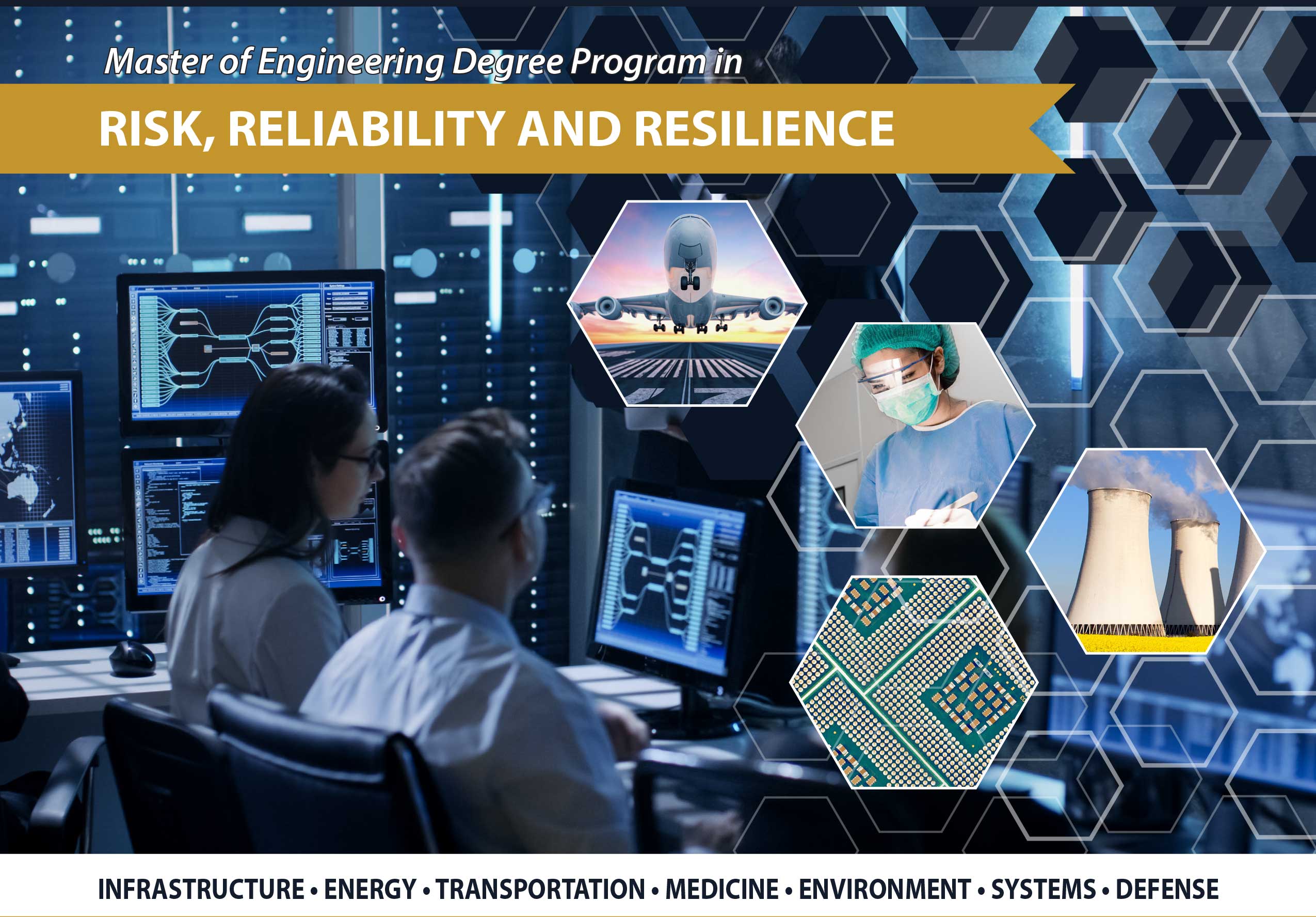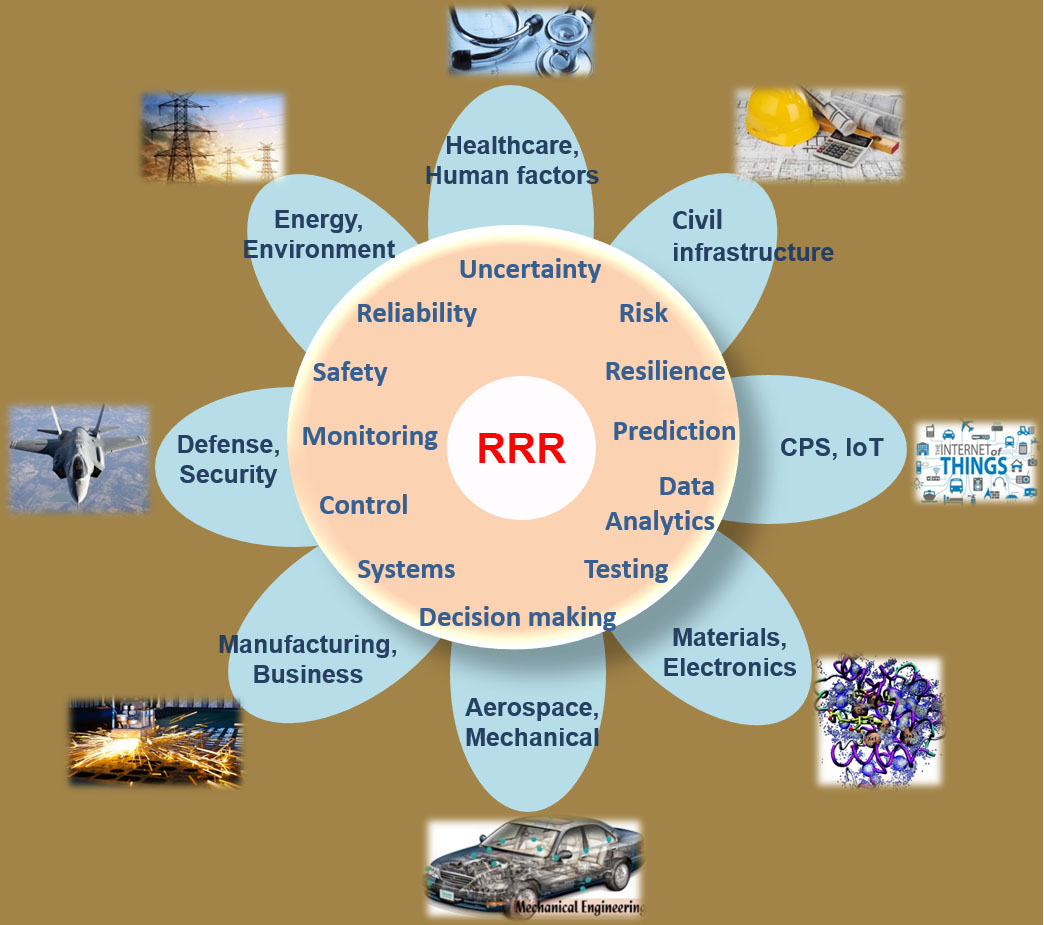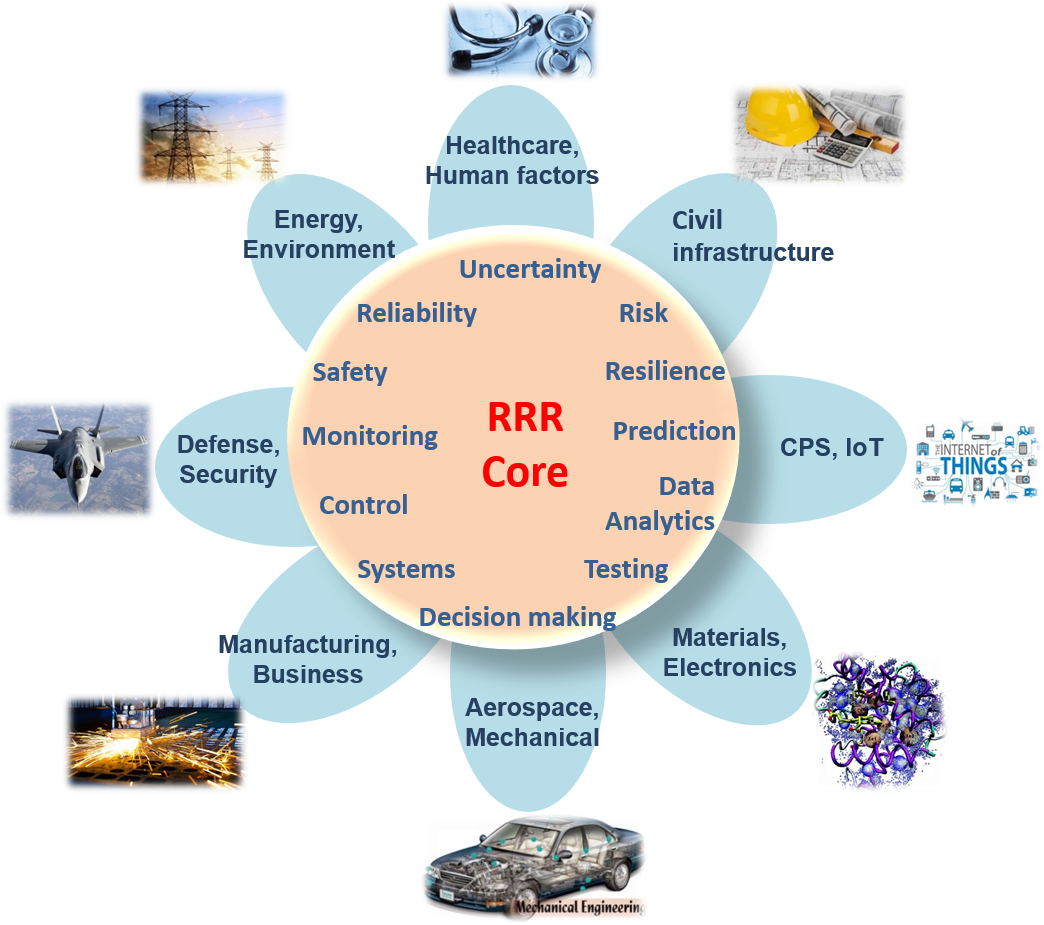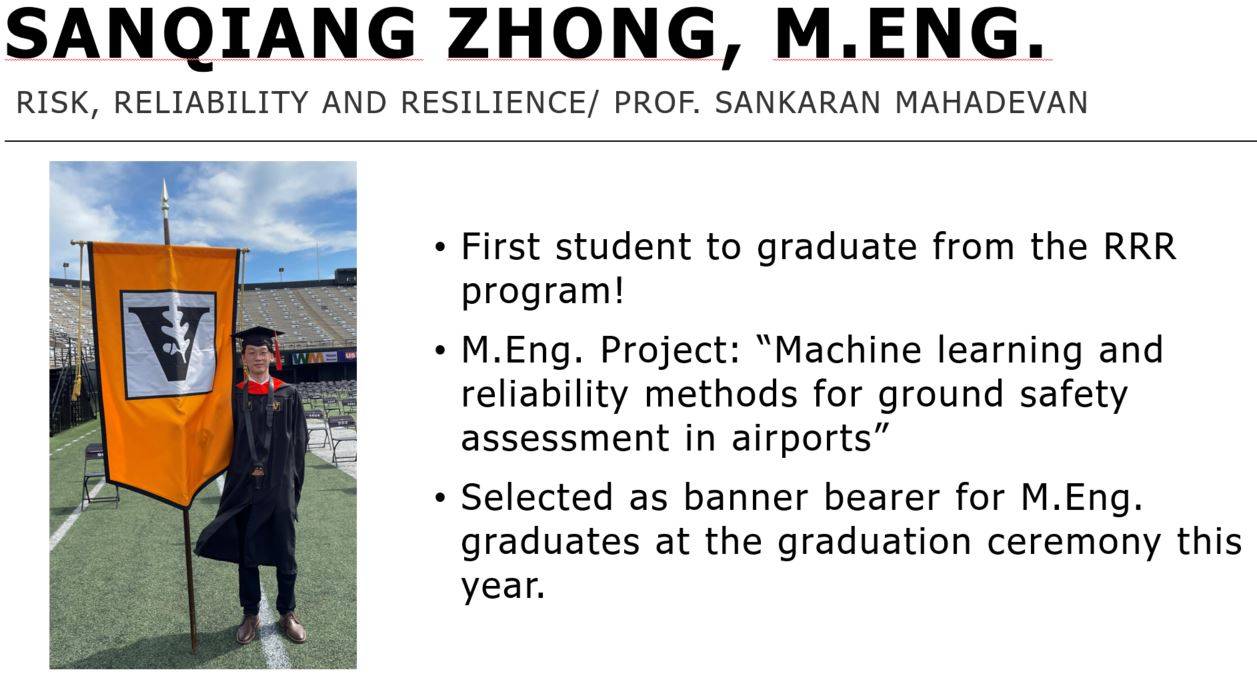Program Overview
Critical systems, processes and devices that support the social and economic well-being of a society are subject to risks of disruptive events, resulting from natural hazards, man-made attacks, malfunctions or accidents during their lifetime. Our critical systems have to be able to not only withstand such events, but also recover from them to an acceptable level of performance within a desired duration.
Vanderbilt University’s M.Eng. degree in Risk, Reliability and Resilience (RRR) engineering is uniquely designed to develop expertise and leadership in making informed decisions that properly account for uncertainty and risk, in order to enhance quality, efficiency, safety, security and environmental protection. The 12-month, 30-hour interdisciplinary program puts graduates on a game-changing career path in organizations of all sizes and types.
Doctor of Philosophy (Ph.D.) and Master of Science (M.S.)
Degrees are offered through the Graduate School and require a combination of coursework and a thesis.
Master of Engineering
Non-thesis based degree is offered through the School of Engineering.


Why choose Vanderbilt?
- Recognized leader in RRR research, education and outreach
- Decades of institutional investment in RRR research facilities and world-class faculty
- Extensive relationships with government agencies, industry and foundations
- Substantial experience in developing impactful solutions for industry, government and society
- Excellence in mentoring and creating immersion experiences for students
We offer a flexible academic curriculum that cuts across multiple disciplines and allows students to tailor their studies to personal interests and goals by selecting courses from different concentrations. The curriculum includes:
- Courses on foundations in risk, reliability and resilience engineering
- Courses in project management, economics, law and public policy
- Elective courses that can be selected from multiple disciplines
- Capstone projects
Why Nashville?
- Real-world laboratory
- Among 100 Rockefeller Resilient Cities
- Home to many Smart City initiatives
- Rapidly expanding industry base and entrepreneurial initiatives
- Rich cultural environment known as Music City, USA
For more information:
Email: vuse.rrr@vanderbilt.edu
To submit an application visit: gradschool.vanderbilt.edu
Apply
| Application deadlines are: | |
| Fall admission: | June 15 |
| Spring admission | November 15 |
To submit an application visit: https://apply.vanderbilt.edu/apply/
Qualifications
Entering students generally are expected to have baccalaureate degrees in engineering, mathematics, or the physical sciences. Admission requirements include an online application, academic performance in previous degree program(s), resume or CV, three letters of recommendation, a statement of purpose, and, if applicable, TOEFL score. An Admissions Committee with representative faculty from the involved departments will evaluate and recommend for approval or disapproval all applications for admission to the M.Eng. degree program in RRR. Admission will be competitive and students will be selected on the basis of their scholastic preparation and intellectual capacity.
The evaluation criteria for admission will be similar to the criteria used for admission in existing M.Eng. and M.S. degree programs offered by the School of Engineering.
RRR Curriculum Plan
The curriculum includes:
- Core courses that cover the foundations for RRR,
- Elective courses that can be selected from multiple disciplines,
- Classes in project management and leadership, and
- Capstone projects.
We offer a flexible academic curriculum that cuts across multiple departments and allows students to tailor their studies to personal interests and goals by selecting courses from different concentrations. A typical plan of study consists of the following requirements:
- RRR Foundations (12 hours)
- RRR Applications (9 hours)
- RRR Management, Law and Policy (6 hours)
- Capstone Project (3 hours)
Courses that can be used for fulfilling the degree requirements include:
RRR Foundations: CE 6300, CE 6305, CE 6310, CE 5999a, CE 5999b, ECE 6361, ECE 6362, BIOS 6341, BIOS 6342, BIOS 7323.
RRR Applications: CE 5240, ECE 5287, ECE 6304, CS 6386, CS 5285, LWEC 8431.
RRR Management, Law and Policy: CE 5300, ENVE 5305, MGT 6480, LWEC 8430, ENGM 5700, ENGM 6500.
Capstone Projects: One of CE 7899, ENVE 7899, CS 8390, ECE 7899, BME 7899, or ME 7899. The capstone projects can be performed during the summer in research centers/institutes that conduct RRR related projects (e.g., LASIR, VECTOR, ISIS, ISDE, CRISS)

Relevant Graduate Courses (Partial list)
Number | Title | Instructor | School |
CE 6300 | Probabilistic Methods in Engineering Design | Mahadevan | Engineering |
CE 6305 | Engineering Design Optimization | Mahadevan | Engineering |
CE 6310 | Uncertainty Quantification | Mahadevan | Engineering |
CE 5999a | Data Analytics for Engineers | Baroud | Engineering |
CE 5999b | Risk and Decision Analysis | Baroud | Engineering |
ECE 5287 | Engineering Reliability | Zhang | Engineering |
ECE 6361 | Random Processes | Wilkes | Engineering |
ECE 6362 | Detection and Estimation Theory | Wilkes | Engineering |
BIOS 6341 | Fundamentals of Probability | Shepherd | Medicine |
BIOS 6342 | Contemporary Statistical Inference | Blume | Medicine |
BIOS 7323 | Applied Survival Analysis | Chen | Medicine |
CE 5240 | Infrastructure Systems Engineering | TBD | Engineering |
ECE 6304 | Radiation Effects and Reliability of Microelectronics | Fleetwood | Engineering |
CS 6386 | System-Level Fault Diagnosis | Biswas | Engineering |
CS 5285 | Network Security | Zhang | Engineering |
LWEC 8431 | Risk and Environmental Regulation II | Byl | Law/Econ |
CE 5300 | Reliability and Risk Case Studies | Abkowitz | Engineering |
ENVE 5305 | Enterprise Risk Management | Abkowitz | Engineering |
ENVE 5615 | Environmental Assessments | Clarke | Engineering |
MGT 6480 | Business Forecasting | March | Owen |
LWEC 8430 | Risk and Environmental Regulation I | Viscusi | Law/Econ |
ENGM 5700 | Program and Project Management | Pence | Engineering |
ENGM 6500 | Engineering Leadership and Program Management | Birdsong | Engineering |
Financial Information
Tuition for M.Eng. students is charged at the same rate as tuition in the graduate school (for 2022/2023 at the rate of $2,215 per semester hour with a minimum tuition charge of $200 per semester). Tuition and fees are set annually by the Board of Trust and are subject to review and change without further notice.
Payment of Tuition and Fees
Tuition, fees, and all other university charges incurred prior to or at registration are due and payment must be received by August 31 for the fall semester and December 31 for the spring semester. All charges incurred after classes begin are due and payment must be received in full by the last business day of the month in which they are billed to the student. If payment is not made within that time, your classes may be canceled. Visit https://finance.vanderbilt.edu/stuaccts/ for payment options.
Students/Guarantors will be responsible for payment of all costs, including reasonable attorney fees and collection agency fees, incurred by the university in collecting monies owed to the university. The university will assess a $25.00 fee for any check or e-payment returned by the bank and reserves the right to invoke the laws of the State of Tennessee governing bad check laws.
E-Billing and Access to a Student’s Vanderbilt Account
Vanderbilt exclusively uses convenient and secure electronic billing (e-bills) for student account charges. Students may need to take action to enable parents, guardians, and other “invited payers” to receive e-bill notices and access to the e-bill website. Students may access their online invoices from their YES landing page at yes.vanderbilt.edu. Once they have signed in to YES, they may view invoices under the Billing Portal link.
Students are responsible for granting access to parents, guardians, or other payers who should receive email billing notifications. To do this, students log in to YES and click the “billing portal link.” On your CashNet Account page, click “Add New” in the “Other Payers” section. Enter the information that is requested, and click “OK.” (You must enter the “login name” that your authorized payer will use as a username—the logon and password will be sent to your authorized payer in an email.) Tutorials are located online at https://finance.vanderbilt.edu/stuaccts/accounts/e-bill-students.php . Any month in which there is activity on the student’s account, an e-bill will be generated and an email notification sent to the student’s Vanderbilt email address, as well as to the email addresses of others they have invited. The email notification will have the subject line “Your E-Bill Is Now Available for Viewing” and will contain a link to the secure e-bill website. Payments may be made electronically, or for those wishing to mail a payment, a payment coupon can be printed. When an electronic payment is made, a confirmation email will be sent. It remains the responsibility of the student to ensure that bills are paid on or before the due date.
The Office of Student Accounts can be contacted at (615) 322-6693, toll-free at (800) 288-1144, or via email at student.accounts@vanderbilt.edu. For additional information, please visit the Student Accounts website at https://finance.vanderbilt.edu/stuaccts/ .
Refunds of Tuition Charges
University policy for the refund of tuition charges provides a percentage refund based on the time of withdrawal. Students who withdraw officially or are dismissed from the university for any reason may be entitled to a partial refund in accordance with the established schedule below. Fees are nonrefundable.
Withdrawal / Refund Schedule:
The schedule to withdraw from courses and the tuition refund schedule for the M.Eng. program is the same as that used for the undergraduate students and can be found in the Undergraduate Catalog (see: Undergraduate Catalog ).
Payment Options
Direct Payment: Tuition, fees, and all other charges are paid directly to the university. Payment for the fall semester is due by August 31. Payment for the spring semester is due by December 31. Students can pay online after viewing their e-bill at https://finance.vanderbilt.edu/stuaccts/ . There is no further action required for this option.
Interest-Free Monthly Payment Plan: Students can spread payment over five monthly installments for each semester (fall and spring), interest free, by enrolling in the VANDYPlan, currently administered by Higher One. Details and important dates can be found at: https://finance.vanderbilt.edu/stuaccts/ For further information, please contact the Office of Student Accounts at (615) 322-6693 or (800) 288-1144.
Late Payment of Fees
All charges not paid by the specified due dates will be assessed a late payment fee of $1.50 on each $100 owed (minimum late fee of $5).
Financial Clearance
No transcript (official or unofficial) will be issued for a student who has an outstanding balance. Diplomas of graduating students will not be released until all indebtedness to the university is cleared.
RRR News
Risk, reliability, resilience master's program has first graduate.

Risk modeling, data integration drive NASA next-gen air travel safety project
Vanderbilt School of Engineering offers new master of risk, reliability, and resilience engineering
Faculty
Program Directors
Sankaran Mahadevan
John R. Murray Sr. Professor of Engineering
Professor of Civil & Environmental Engineering
Professor of Mechanical Engineering
(615) 322-3040
sankaran.mahadevan@vanderbilt.edu
http://www.reliability-studies.vanderbilt.edu/
Mark D. Abkowitz
Professor, Department of Civil & Environmental Engineering
(615) 343-3436
mark.d.abkowitz@vanderbilt.edu
Participating Faculty
| Name | Rank | Department |
| Mark Abkowitz | Professor | Civil and Environmental Engineering |
| Douglas Adams | Professor | Civil and Environmental Engineering, Mechanical Engineering |
| Hiba Baroud | Assistant Professor | Civil and Environmental Engineering |
| Gautam Biswas | Professor | Electrical Engineering and Computer Science |
| Kevin Brown | Research Associate Professor | Civil and Environmental Engineering |
| Janey Camp | Research Associate Professor | Civil and Environmental Engineering |
| Bruce Cooil | Professor | Owen Graduate School of Management |
| Mark Cohen | Professor | Owen Graduate School of Management |
| Benoit Dawant | Professor | Electrical Engineering, Biomedical Engineering |
| Abhishek Dubey | Assistant Professor | Electrical Engineering and Computer Science |
| Daniel Fleetwood | Professor | Electrical Engineering and Computer Science |
| Kenneth Galloway | Professor | Electrical Engineering and Computer Science |
| Jonathan Gilligan | Associate Professor | Earth and Environmental Sciences |
| Manav Vohra | Research Assistant Professor | Civil and Environmental Engineering |
| Gabor Karsai | Professor | Electrical Engineering and Computer Science |
| Xenofon Koutsoukos | Professor | Electrical Engineering and Computer Science |
| David Kosson | Professor | Civil and Environmental Engineering, Chemical Engineering |
| Steve Krahn | Professor of the Practice | Civil and Environmental Engineering |
| Sankaran Mahadevan | Professor | Civil and Environmental Engineering, Mechanical Engineering |
| Salvatore March | Professor | Owen Graduate School of Management |
| Caglar Oskay | Associate Professor | Civil and Environmental Engineering |
| Ken Pence | Associate Professor of Practice | Engineering Management |
| Craig Phillip | Research Professor | Civil and Environmental Engineering |
| Robert Reed | Professor | Electrical Engineering and Computer Science |
| J.B. Ruhl | Professor | Law School |
| Ronald Schrimpf | Professor | Electrical Engineering and Computer Science |
| Janos Sztipanovits | Professor | Electrical Engineering and Computer Science |
| Lori Troxel | Associate Professor | Civil and Environmental Engineering |
| Michael P. Vandenbergh | Professor | Law School |
| Timothy Vogus | Associate Professor | Owen Graduate School of Management |
| Yevgeniy Vorobeychik | Assistant Professor | Electrical Engineering and Computer Science |
| Kip Viscusi | Distinguished Professor | Law, Economics |
| Robert Webster | Associate Professor | Mechanical Engineering |
| Matthew Weinger | Professor | School of Medicine |
| D. Mitchell Wilkes | Professor | Electrical Engineering and Computer Science |
| Daniel Work | Associate Professor | Civil and Environmental Engineering |
| Enxia Zhang | Research Asst. Professor | Electrical Engineering and Computer Science |
Related Research Groups
THE BELOW ARE RESEARCH GROUPS THAT DEAL WITH RISK, RELIABILITY, AND RESILIENCE HERE AT VANDERBILT.
Center for Research & Innovation in Systems Safety (CRISS)
CRISS investigators are particularly interested in designing and evaluating medical technologies (i.e., devices and information systems) with an emphasis on the effects of the introduction of new technologies on clinical care and the use of electronically generated clinical data to identify evolving events and support decision-making. We also conduct studies to understand the causes of unexpected clinical events and how such events might be prevented.
Institute for Software Integrated Systems (ISIS)
ISIS conducts basic and applied research in the area of systems and information science and engineering. Applications of ISIS technology span a wide range of software-intensive systems from small embedded devices, through real-time distributed systems, to globally deployed complex systems. Software is increasingly essential to the functions of these systems, and it is also the primary means of adapting them to their environments and users. Our research interests lie in the theoretical foundations, modeling, design, engineering, and educational aspects of these systems.
Institute for Space & Defense Electronics (ISDE)
The mission of the Institute for Space and Defense Electronics (ISDE) is to contribute to the design and analysis of radiation-hardened electronics, the development of test methods and plans for assuring radiation hardness, and the development of solutions to system-specific problems related to radiation effects.
Laboratory for Systems Integrity & Reliability (LASIR)
LASIR is a vibrant discovery and learning community populated by students, staff-in-residence, and faculty who make use of the laboratory as a destination for doing collaborative experiments at a realistic scale to maximize the impact of their research. Our graduate and undergraduate students are at the center of the learning community leading to unique networking and career opportunities. Students conduct scholarly research while having a significant impact on state-of-the-art sensing and simulation tools that are solving some of the nation’s grand challenges in energy, security and other areas. From projects to develop more efficient hybrid vehicles with brake energy recovery systems to programs that enable the design of future aerospace systems including intelligent aircraft and satellites, students are exposed not only to their own research topic but also to interdisciplinary challenges their colleagues from diverse backgrounds are facing.
Reliability & Risk Engineering & Management
The Multidisciplinary Reliability and Risk Engineering and Management Studies project is the first in the world to study and develop integrated multidisciplinary computational and experimental approaches to assessing and managing risk and reliability. The project's pioneering approach is unique, and the techniques are broadly applicable across engineering and management disciplines.
Vanderbilt Center for Transportation & Operational Resiliency (VECTOR)
VECTOR, established in 1988, has a solid record of achievement and is committed to continued excellence in all three of its mission components—research, education, and outreach. Recognizing the complexity of transportation issues in the private sector and at every level of government, VECTOR emphasizes the integration of transportation engineering, planning, and management. Other distinguishing characteristics of VECTOR’s work include ground-breaking applications of information technology and risk management, systems thinking, and adherence to our statement of shared values.
THE BELOW ARE PROGRAMS OF STUDY THAT DEAL WITH RISK, RELIABILITY, AND RESILIENCE HERE AT VANDERBILT.
Contact
For inquiries and more information, please contact:
Assistant Dean for Graduate Recruiting and Global Engagement:
Gabriel Luis
gabriel.w.luis@vanderbilt.edu
615-343-3128
Program Co-Director:
Sankaran Mahadevan
sankaran.mahadevan@vanderbilt.edu
615-322-3040
Program Co-Director:
Mark Abkowitz
mark.abkowitz@vanderbilt.edu
615-343-3436